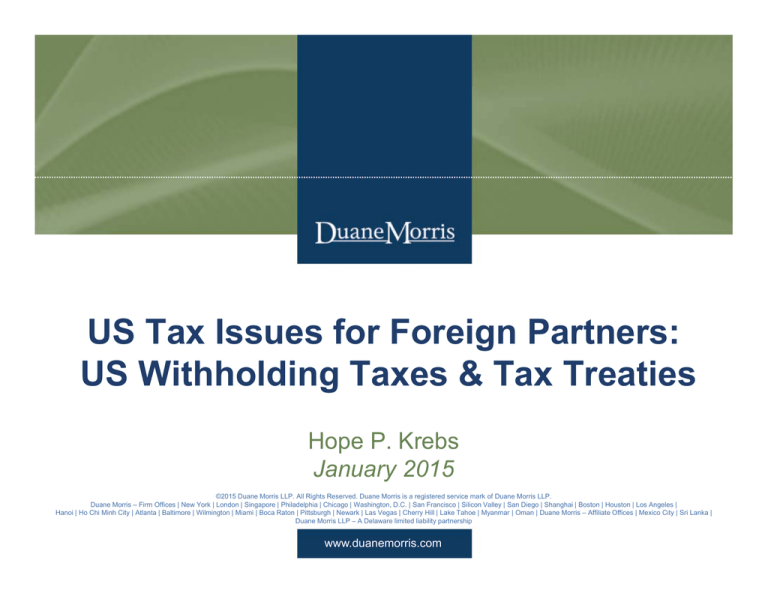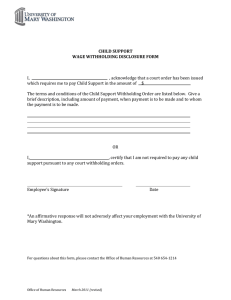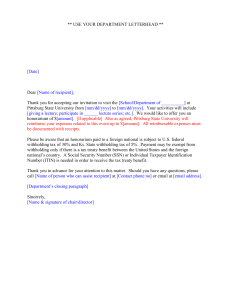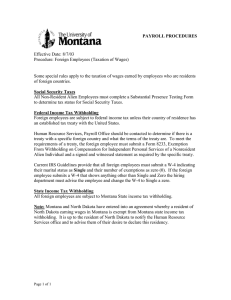
US Tax Issues for Foreign Partners:
US Withholding Taxes & Tax Treaties
Hope P. Krebs
January 2015
©2015 Duane Morris LLP. All Rights Reserved. Duane Morris is a registered service mark of Duane Morris LLP.
Duane Morris – Firm Offices | New York | London | Singapore | Philadelphia | Chicago | Washington, D.C. | San Francisco | Silicon Valley | San Diego | Shanghai | Boston | Houston | Los Angeles |
Hanoi | Ho Chi Minh City | Atlanta | Baltimore | Wilmington | Miami | Boca Raton | Pittsburgh | Newark | Las Vegas | Cherry Hill | Lake Tahoe | Myanmar | Oman | Duane Morris – Affiliate Offices | Mexico City | Sri Lanka |
Duane Morris LLP – A Delaware limited liability partnership
www.duanemorris.com
US Withholding Tax – In General
•
Mechanism for collecting US tax on mobile income paid to
foreign persons:
–
–
•
•
Burden imposed on payor of income; and
Payor may be US or foreign.
May be reduced or eliminated by treaty.
Significant penalties imposed on payer for failure to
withhold.
www.duanemorris.com
5 Types of US Withholding
•
•
US source services income
Foreign partner’s share of US-connected partnership
income
–
•
•
•
US partnerships treated differently than foreign partnerships
FATCA [IRC Chapter 4 withholding]
US source fixed determinable annual or periodic (FDAP)
income [IRC Chapter 3 withholding]
FIRPTA withholding on disposition of US real property
interest
www.duanemorris.com
Services Income Withholding
•
U.S. source income only taxed in the US:
–
•
Source based on place of performance
If paid to foreign corporation or foreign partnership:
–
Generally, no withholding because it is effectively connected
income (ECI)
•
IRC §§ 1442(a), 1441(c)(1)
If paid to nonresident alien individual:
–
Independent contractor
IRC § 1441 FDAP withholding
–
Employee
IRC § 3401 Employee withholding
www.duanemorris.com
Foreign Partner Withholding by US Partnership
•
Distributive share of US partnership’s:
–
US source FDAP income
30% withholding unless reduced or eliminated by a treaty
–
Reg. § 1.1441-3(f)
Income effectively connected to the conduct of a trade or business
within the US (ECI)
Withholding at highest IRC §1 or §11 rate in effect for year
•
Nonresident alien individual partners – 39.6% in 2015
Foreign corporation partners - 35% in 2015
» IRC § 1446; Reg. §§ 1.1446-1 to 1.1446-7
Actual distribution of US source FDAP income:
–
30% withholding unless reduced or eliminated by a treaty
Reg. § 1.1441-3(f)
www.duanemorris.com
Foreign Partner Withholding by Foreign Partnership
•
Foreign partnership required to withhold only on foreign
partners share of ECI, not FDAP income.
IRC § 1446; Reg. §§ 1.1446-1 to 1.1446-7
•
US tax is withheld at highest IRC §1 or §11 rate in effect
for year.
Nonresident alien individual partners – 39.6% in 2015
Foreign corporation partners - 35% in 2015
www.duanemorris.com
FATCA [Chapter 4] Withholding
•
Payer of “withholdable payment” must withhold 30% from
such amount paid to a non-U.S. payee UNLESS payee
agrees to provide information with respect to its U.S.
customers or owners.
–
•
Withholdable payment = U.S. source FDAP income or gross
proceeds related to U.S. source FDAP securities.
Chapter 4 withholding applied BEFORE Chapter 3
withholding.
IRC §§ 1471-1474
www.duanemorris.com
US Source FDAP Income [Chapter 3] Withholding
•
Withholding tax imposed on US source FDAPI.
–
•
IRC §§ 1441 & 1442
US withholding at 30% rate unless payor receives appropriate Form
W-8 claiming entitlement to reduction in or exemption from US
withholding tax.
–
–
–
–
–
Form W-8BEN, Certificate of Foreign Status of Beneficial Owner for
United States Tax Withholding and Reporting (Individuals);
Form W-8BEN-E, Certificate of Status of Beneficial Owner for United
States Tax Withholding and Reporting (Entities);
Form W-8ECI, Certificate of Foreign Person's Claim That Income Is
Effectively Connected With the Conduct of a Trade or Business in the
United States;
Form W-8IMY, Certificate of Foreign Intermediary, Foreign Flow-Through
Entity, or Certain U.S. Branches for United States Tax Withholding and
Reporting; and
Form W-8EXP, Certificate of Foreign Government or Other Foreign
Organization for United States Tax Withholding and Reporting.
www.duanemorris.com
FIRPTA Withholding
•
•
Triggered in connection with the disposition of a US real property
interest (USRPI) by a foreign person.
Buyer (US or foreign) must withhold 10% of foreign seller’s amount
realized in connection with a disposition of USRPI.
–
Amount realized = gross proceeds + liabilities assumed
•
•
IRC § 1445(a)
Special rules for distributions of USRPIs by entities.
A partnership interest will be considered a USRPI if (1) 50 percent or
more of the value of the partnership’s gross assets consists of U.S.
real property interests, and (2) 90 percent or more of the value of the
partnership’s gross assets consists of U.S. real property plus cash or
assets readily convertible into cash.
www.duanemorris.com
Use of Income Tax Treaties
by Foreign Partners
©2015 Duane Morris LLP. All Rights Reserved. Duane Morris is a registered service mark of Duane Morris LLP.
Duane Morris – Firm Offices | New York | London | Singapore | Philadelphia | Chicago | Washington, D.C. | San Francisco | Silicon Valley | San Diego | Shanghai | Boston | Houston | Los Angeles |
Hanoi | Ho Chi Minh City | Atlanta | Baltimore | Wilmington | Miami | Boca Raton | Pittsburgh | Newark | Las Vegas | Cherry Hill | Lake Tahoe | Myanmar | Oman | Duane Morris – Affiliate Offices | Mexico City | Sri Lanka |
Duane Morris LLP – A Delaware limited liability partnership
www.duanemorris.com
Income Tax Treaties
•
•
•
•
Bi-lateral agreements between 2 governments.
Promote trade and investment by dividing taxing
jurisdiction between the 2 countries to lessen incidence of
double taxation.
US has treaties with a number of (but not all) foreign
countries.
Each US treaty has different provisions, though they are
similarly structured.
www.duanemorris.com
Impact of Treaties on Foreign Partners
•
If applicable, an income tax treaty may reduce eliminate
US federal income tax otherwise imposed on a foreign
partner.
–
•
N/A to state tax
Savings clause – generally prevents treaty from reducing
US taxes of US partners.
www.duanemorris.com
Key Treaty Concepts
•
•
Resident;
Substantive Tax Provisions
–
–
–
•
•
•
Business Profits/Permanent Establishment
Dividends, Interest, Rents, Royalties
Other Income
Limitation on Benefits
Competent Authority
US Domestic Law Limitations
www.duanemorris.com
Treaty Residency
•
•
•
Only individuals and entities that fit within the treaty
definition of “resident” can claim the benefits of a treaty.
Definitions of “resident” vary by treaty.
Nearly all US treaties have a tie-breaker rule for those
situations where an individual or entity is considered to be
a resident of BOTH treaty countries.
www.duanemorris.com
Business Profits/Permanent Establishment
•
To be taxable in the US, treaties provide that “business
profits” of a foreign partner must be attributable to a
“permanent establishment” (“PE”) in the US.
–
“Business profits”
Includes foreign partner’s share of partnership’s ECI
Determined on a net basis
–
“PE”
Generally means an office or other fixed place of business of
partnership (or partner) in the US
Can include dependent agents and employees even if they do not
work at a fixed place of business
Certain preliminary and auxiliary activities can be exempted from the
definition
www.duanemorris.com
Dividends, Interest, Rents and Royalties
•
•
Nearly all treaties contain separate articles dealing with
the taxation and rates of tax on various types of passive
income, including dividends, interest, rents and royalties.
Rates and exemptions vary by treaty.
www.duanemorris.com
Other Income
•
•
Many treaties contain an “Other Income” article.
Specifies how income that is not covered by another
specific article of the treaty is taxed.
–
–
Frequently will result in taxation of “other income” by only country
of residence.
Some treaties tax “other income” based on where income arises.
www.duanemorris.com
Limitation on Benefits
•
•
Designed to prevent treaty-shopping. Contained in nearly all US
treaties.
Typical modern LOB articles limit treaty benefits to the following
qualifying persons that are resident in a Contracting State:
–
–
–
–
–
–
–
•
Individuals;
Contracting States or their political subdivisions or local authorities;
Tax-exempt organizations and pension funds;
Publicly traded companies and certain subsidiaries;
Persons other than individuals satisfying ownership and base erosion tests;
Enterprises engaged in an active trade or business in the residence State, if none
of the foregoing tests are met; and
Persons obtaining a favorable determination from the source-State competent
authority , if none of the foregoing tests are met.
Some treaties include other additional tests:
–
–
“Derivative benefits” test – third country treaty residents meeting appropriate
criteria may count towards meeting the base erosion test; and
Income derived from the source State that is connected with, or incidental to, an
active trade or business conducted by the enterprise (or, under some treaties, a
related person) in the residence State that is substantial in relation to the trade or
business activity carried on by the enterprise (or related person) in the source
State.
www.duanemorris.com
Competent Authority
•
•
If, notwithstanding the provisions of the treaty, a resident
on one country will be taxed on the same income by both
countries, the Competent Authorities of the two countries
can resolve the issue on a taxpayer by taxpayer basis.
Under the Treaty’s Mutual Agreement Procedure, a
Taxpayer seeks relief from the Competent Authority of the
Contracting State with respect to which he is resident or
citizen.
www.duanemorris.com
US Domestic Law Limitations on Treaties
•
•
•
IRC § 7852(d)(1)
IRC § 894(c)
Other US Treaty Limitations:
–
–
Conduit financing regulations; and
IRC § 884(e) qualified resident rules.
www.duanemorris.com
IRC § 7852(d)(1)
•
•
Neither a tax treaty nor US domestic law is entitled to
preferential status by reason of it being a treaty or law.
Last enacted rule generally controls:
–
–
Treaty can override previously enacted legislation; and
Subsequently enacted legislation can override existing treaties.
www.duanemorris.com
IRC § 894(c)
•
Denies treaty benefits to certain entities that are fiscally transparent for
U.S. tax purposes (“hybrid” entities).
–
•
Applies to item of income derived through a fiscally transparent entity, such as a U.S.
partnership, if (1) such item is not treated as an item of income of such foreign person for
purposes of the taxation laws of the foreign country; (2) the foreign country does not
impose tax on a distribution of such item of income from the fiscally transparent entity to
the foreign person; and (3) the relevant treaty does not contain a provision addressing the
applicability of the treaty in the case of an item of income derived through a partnership.
Treasury regulations under IRC § 894(c) contain one set of rules for hybrid
entities and another for “domestic reverse hybrid entities” (entity that is not
fiscally transparent for purposes of U.S. taxation but is fiscally transparent
under the tax laws of the residence country of a person holding an interest
in the entity).
–
–
Hybrids - an item of income received by a person (including a single member disregarded
entity and excluding individuals), wherever organized, that is fiscally transparent under the
laws of the United States (or any other jurisdiction with respect to an item of income) is
eligible for a reduced rate of withholding under an applicable U.S. income tax treaty only if
the item of income is derived by a resident of the applicable treaty jurisdiction.
Reverse hybrids - treaty benefits generally denied with respect to U.S. source income of a
“reverse domestic hybrid entity”. If certain conditions are met, a payment by a domestic
reverse hybrid entity to a related foreign person holding an equity interest in the hybrid is
recharacterized as a dividend distribution by the hybrid for all purposes of the Code and
applicable treaty to the extent of the lesser of (1) the amount of the payment or (2) the
interest holder's proportionate share of dividends distributed by the related domestic entity
to the hybrid.
www.duanemorris.com
US Procedural Aspect of Treaties
•
•
Foreign partner may need to file various forms with the
IRS or withholding agent to claim treaty benefits.
May need to file US tax return:
–
–
•
•
Form 1040-NR, U.S. Nonresident Alien Income Tax Return
Form 1120-F, U.S. Income Tax Return of a Foreign Corporation
May need to attach Form 8833, Treaty-Based Return
Position Disclosure Under Section 6114 or 7701(b) to
partner’s tax return.
Provide appropriate Form W-8 to withholding agent.
–
Generally use W-8BEN or -BEN-E, or -IMY when claiming treaty
benefits.
www.duanemorris.com
Further information
Hope P. Krebs, Esq.
hpkrebs@duanemorris.com
+1 (215) 979 1964
www.duanemorris.com
US Tax Issues for Foreign Partners:
US Withholding Taxes & Tax Treaties
Hope P. Krebs
January 2015
©2015 Duane Morris LLP. All Rights Reserved. Duane Morris is a registered service mark of Duane Morris LLP.
Duane Morris – Firm Offices | New York | London | Singapore | Philadelphia | Chicago | Washington, D.C. | San Francisco | Silicon Valley | San Diego | Shanghai | Boston | Houston | Los Angeles |
Hanoi | Ho Chi Minh City | Atlanta | Baltimore | Wilmington | Miami | Boca Raton | Pittsburgh | Newark | Las Vegas | Cherry Hill | Lake Tahoe | Myanmar | Oman | Duane Morris – Affiliate Offices | Mexico City | Sri Lanka |
Duane Morris LLP – A Delaware limited liability partnership
www.duanemorris.com



